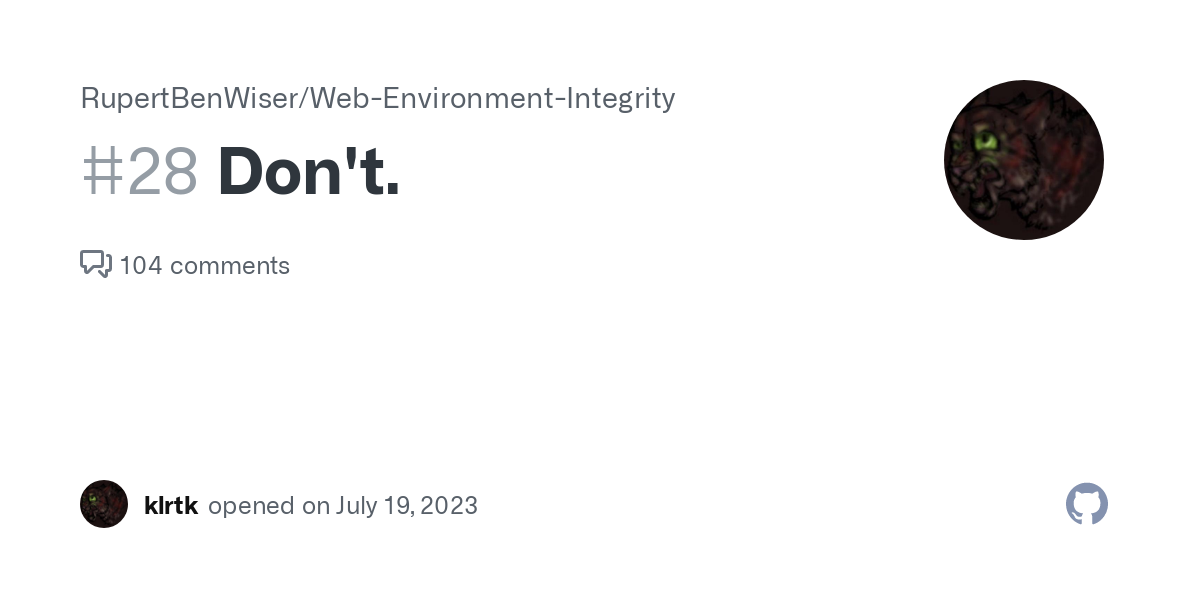Hey everyone, thank you for your patience, and thank you to everyone who engaged constructively. It is clear based on the feedback we’ve received that a bigger discussion needs to take place, and I’m not sure my personal repository is the best place to do that - we are looking for a better forum and will update when we have found one. We want to continue the discussion and collaborate to address your core concerns in an improved explainer.
I want to be transparent about the perceived silence from my end. In the W3C process it is common for individuals to put forth early proposals for new web standards, and host them in a team member’s personal repository while pursuing adoption within a standards body. My first impulse was to jump in with more information as soon as possible - but our team wanted to take in all the feedback, and be thorough in our response.
That being said, I did want to take a moment to clarify the problems our team is trying to solve that exist on the web today and point out key details of this early stage proposal that may have been missed.
WEI’s goal is to make the web more private and safe The WEI experiment is part of a larger goal to keep the web safe and open while discouraging cross-site tracking and lessening the reliance on fingerprinting for combating fraud and abuse. Fraud detection and mitigation techniques often rely heavily on analyzing unique client behavior over time for anomalies, which involves large collection of client data from both human users and suspected automated clients.
Privacy features like user-agent reduction, IP reduction, preventing cross-site storage, and fingerprint randomization make it more difficult to distinguish or reidentify individual clients, which is great for privacy, but makes fighting fraud more difficult. This matters to users because making the web more private without providing new APIs to developers could lead to websites adding more:
sign-in gates to access basic content invasive user fingerprinting, which is less transparent to users and more difficult to control excessive challenges (SMS verification, captchas) All of these options are detrimental to a user’s web browsing experience, either by increasing browsing friction or significantly reducing privacy.
We believe this is a tough problem to solve, but a very important one that we will continue to work on. We will continue to design, discuss, and debate in public.
WEI is not designed to single out browsers or extensions Our intention for web environment integrity is to provide browsers with an alternative to the above checks and make it easier for users to block invasive fingerprinting without breaking safety mechanisms. The objective of WEI is to provide a signal that a device can be trusted, not to share data or signals about the browser on the device.
Maintaining users’ access to an open web on all platforms is a critical aspect of the proposal. It is an explicit goal that user agents can browse the web without this proposal, which means we want the user to remain free to modify their browser, install extensions, use Dev tools, and importantly, continue to use accessibility features.
WEI prevents ecosystem lock-in through hold-backs We had proposed a hold-back to prevent lock-in at the platform level. Essentially, some percentage of the time, say 5% or 10%, the WEI attestation would intentionally be omitted, and would look the same as if the user opted-out of WEI or the device is not supported.
This is designed to prevent WEI from becoming “DRM for the web”. Any sites that attempted to restrict browser access based on WEI signals alone would have also restricted access to a significant enough proportion of attestable devices to disincentivize this behavior.
Additionally, and this could be clarified in the explainer more, WEI is an opportunity for developers to use hardware-backed attestation as alternatives to captchas and other privacy-invasive integrity checks.
WEI does not disadvantage browsers that spoof their identity The hold-back and the lack of browser identification in the response provides cover to browsers that spoof their user agents that might otherwise be treated differently by sites. This also includes custom forks of Chromium that web developers create.
Let’s work together on finding the right path We acknowledge facilitating an ecosystem that is open, private, and safe at the same time is a difficult problem, especially when working on the scale and complexity of the web. We welcome collaboration on a solution for scaled anti-abuse that respects user privacy, while maintaining the open nature of the web.
Hardware backed attestation isn’t about security or privacy, if you can’t pass SafetyNet on your Android device you can’t install certain apps, but even with stock software and passing SafetyNet you can still install malware direct from the App Store, it’s about vendor lock in, always has been.
Edit: Clarified my point.
Removed by mod
This is the part that caught my attention:
Privacy features like user-agent reduction, IP reduction, preventing cross-site storage, and fingerprint randomization make it more difficult to distinguish or reidentify individual clients, which is great for privacy, but makes fighting fraud more difficult.
And we do those things, not because we’re fraudsters, but because we’re trying to protect ourselves from the likez of YOU!
YOU did this, change your model and maybe it’ll be better? Oh! But! Mooooooooney! I forgot. Stupid me.
This is the fucking bully telling the nerd that if he doesn’t just HAND OVER his lunch money, that he’ll get beat. It’s YOUR fault! Not OURS!
Edit: Formatting and added about bully
Edit 2: fixing the formatting of the formatting edit. :-D lol
Look at the steps we have to go through? Firefox container tabs just for google products, have to switch to DDG as default after every update, have to keep the browser extensions updated, have to use vpn, tried to not use google open auth when register on 3rd party sites, have to clean the cookies regularly, have to click through those cookie settings visiting a site. Oh, and have to go around the amp link when trying to share a searched image/page result.
lol are you on my machine? :-D
Just wait until tomorrow, next week, next year…
WEI’s goal is to make the web more private and safe The WEI experiment is part of a larger goal to keep the web safe and open
(Emphasis mine)
They contradict themselves in the span of 2 sentences. Great look, folks.
How is that a contradiction?
The Open Internet (OI) is a fundamental network (net) neutrality concept in which information across the World Wide Web (WWW) is equally free and available without variables that depend on the financial motives of Internet Service Providers (ISP).
Open is not the opposite of private. You can have an open internet where your information is not shared with third parties, i.e. private.
The web is currently a communal well. We all drink from it because people before us paid the foundations.
Google aims to be the owner of that well. Like the land and oil barons before them, they wish to monetize every last second of web access.
That same corporation, to spew such vile, ignorant nonsense is…well, I guess it shouldn’t be much of a surprise, should it?
“Privacy features like user-agent reduction, IP reduction, preventing cross-site storage, and fingerprint randomization make it more difficult to distinguish or reidentify individual clients, which is great for privacy, but makes fighting fraud more difficult. This matters to users because making the web more private without providing new APIs to developers could lead to websites adding more:”
Ohhh it’s fighting fraud that they want to do! And here I thought it was entirely for the much more profitable goal of maintaining advertising revenue. Well, I’m SO GLAD to be wrong on that one. Slash S.
The objective of WEI is to provide a signal that a device can be trusted
This is exactly the opposite of everything anyone would learn in CompSci 101.
NEVER TRUST THE CLIENT. CLIENTS CANNOT BE TRUSTED. CLIENTS ARE NOT SANE. THAR BE DRAGONS THERE. (Maybe that last one is pirate treasure maps, but I think it holds.)
Anyone who is buying this guy’s argument that they’re trying to make it so you can trust clients, should immediately be removed from any computers they are in possession of and be “invited” by men in black suits to go live on a nice agrarian farm where the only computer available is an air-gapped Tandy TRS-80 MC-10. They can rejoin humanity when they’ve relearned the lessons of the last 40 years and understand why this is just patently insane.
I think your and their definition of “trusted” is a bit different. They mean trusted as in “very likely a real human”. That’s not enough to allow any privileged access, but it should help when trying to block bots heuristically while preserving a good experience for real users. “Trusted” devices could skip capture checks for example.
Of course this doesn’t make this proposal any better, it’s still extremely dangerous and misguided imo!
Anyone who’s played an online game in the past 30+ years knows that nothing is secure on a client machine. You have to rotate offsets and encryption keys constantly, and even then you buy yourself a few days at the most. You’d think google would have actual good engineers, what are they paying all that money for?
“You’re blowing this out of proportion… circular speech… platitudes… and this will make everything better!”
comments disabled
deleted by creator
When we all started using Chrome to get away from Microsoft’s web stewardship that arose from everyone using IE.
we just need another large corporation to save us again
Probably when “I use ie to download chrome” became a mainstream meme.
Unfortunately this is a money-ocracy (data-exploitation-ocracy), not a democracy.
deleted by creator
I do web dev and I can say I was super guilty of this back in the 2010s. I bit the hype hard, and now we’re getting right back to the circumstances that made ie such a POS to work with. (In my defense, I got my dev job in 2013 and had to develop for ie6. It’s not a good defense, but I think that really lead to my overhype for google. I had no knowledge of chrome’s bloated whale carcass days, so it always felt like the browser that “just worked ™”)
Market monopoly inspires evil in the good intentioned. Market monopoly also inspires nefariousness in the evil.
I’d say this is the sort of thing that inspired Google to remove the “don’t be evil” from their guidelines.
You must mean ie7, surely?
I was developing for ie6 back in 2010 and I considered those to be dark, dark times. I can’t believe it hung on for another 3 years?
We had some demanding clients lol
I remember having to use pie.htc to hack rounded corners for buttons into ie6. I remember liking ie7 a little bit better, but ie8 felt like a god send compared to 6 lmao
I recall having to support multiple versions of ie as well at the same time as well. I can’t remember what year we dropped support for ie6 but it wasn’t too long after I started.
I danced every time we got to drop another ie support version all the way up to 11
deleted by creator
Maybe when we allowed money (here represented by the size of the browser market share) to translate directly into political power (here represented by the ability to enforce arbitrary standards).
WEI prevents ecosystem lock-in through hold-backs
We had proposed a hold-back to prevent lock-in at the platform level. Essentially, some percentage of the time, say 5% or 10%, the WEI attestation would intentionally be omitted, and would look the same as if the user opted-out of WEI or the device is not supported.This is designed to prevent WEI from becoming “DRM for the web”.
At least this acknowledges that this proposal would in fact be “DRM for the web” if the only thing from preventing it from being that is an additional measure unrelated to the core implementation.
Not to mention, what prevents a future release of the feature either turning the percentage to 0% or removing the hold-back entirely?
Yes or a “retry until attestation received” strategy by websites.
And if attestations are rate limited then a grace period until they can get enough attempts in to be confident.
If sites are expected to accept opted-out clients because they might just be randomly non-attested, why wouldn’t the hackers and fraudsters just opt out of attestation?
I guess the idea is that the “fraudsters” would have to opt out of every attestation, so after many requests, the client can be identified as likely refusing every attestation. I agree with your first point: many sites will do everything they can to get an attestation from the client.
Not to mention, what prevents a future release of the feature either turning the percentage to 0% or removing the hold-back entirely?
Imo thats like the main issue here. Google tweaks chromium changing a single number and everything goes to shit. This proposal is a trojan horse!
lol
Nice internet you have there. It would be a shame if something “happened” to it.
“We’re the good guys, trust me!”
we are looking for a better forum and will update when we have found one.
The only acceptable forum for this garbage is the deepest pits of hell. Fuck off forever.
How does this person sleep at night?
On a pile of advertising money
People like this don’t feel remorse, they aren’t capable of it. Lying to placate the dumb masses is natural to them, because they assume that all other human beings can only feel either rage or greed like they do.
Their response sounds genuine, I think it’s more a matter of myopic optimism taken advantage of by the broader company. They don’t have to be explicitly evil if their otherwise moral employees trust the corporate apparatus to not abuse powers granted to them in the name of security.
All roads with Google lead to tracking and advertising
Hey, thank you so much for the feedback on having the wolf guard the sheep. It’s clear from the discussion that there some concern around using ravenous carnivores to guard prey-animals and we want to continue this important discussion in a meaningless way so it looks like we give a shit before we make the wolf guard the sheep after “a significant time to discuss and address concerns”. We will obviously listen to take onboard feedback such as “what colour fur should the wolf have” and “should it be a male wolf or a female wolf?”. Don’t worry you’ll be able to significantly change this proposal as long as the net result is that a wolf ends up guarding the sheep. Thank you so much for all the involvement from all you sheep. Kind regards, The Wolf.
You know who the least trusted party is here? Not privacy-focused users, not even malicious users and bots. You are the least trusted party here. The greatest point of security vulnerability is giving greater control of what does and doesn’t get seen to a company that’s proven itself to be a bad actor.
Megacorps that feed on our data are the danger. Not just to network security, but to humanity. We don’t want or need you limiting our access to information and to one another so that you can further lock down your pilfering of our personal data and your force-feeding of ads and toxic cultural forces.
The abuse of this responsibility has already caused untold damage to our individual lives, the functioning of our societies, and our actual planet itself. It’s led to the mass promotion of some of the worst ideas in human history, and the diminishment of good will, social cohesion, and personal autonomy. The last thing we need is more overreach.
Leave the internet alone. Go make a game or something.
My big concern with this and the new digital standard for images that they’re proposing is that it looks to make the internet less anonymous than even in-person interactions. To me, that’s a complete destruction of one of the most valuable features of the internet. To some extent, anonymity is a shield against tyranny; a government can’t exactly come and drag you off for re-education if they can’t tell who made the image mocking the dear leader. No matter who you are or how you identify politically, we should be able to throw our tomatoes anonymously if we do choose, without threat of Google telling the Chinese or American governments who threw them.
I just want to post my little comments online without having it tied to my identity. Why? More people see what I say than in real life, some of them could be crazies. I don’t want my real identity right there for the SWATting the second I say I like to knit because it’s a craft of Satan and his ilk or something. Or more likely, that I support LGBTQ+ rights so blacklist me, and kill me for not following the laws of your religion that considers this a bad thing. I want this hidden behind Evergreen5970 so if you want to hurt me you at least have to put some work in to find me, which is a wonderful deterrent for this behavior.
This is Troll Trace
New digital standard for images?
















